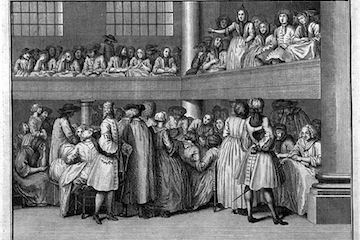Quakers, Abolitionism, and Women's Suffrage
For much of American history, the Quaker sect has been an advocate for liberal causes, based on their views of Christianity and equality. From the Sect's founding by George Fox, in 17th century England, through the days of Susan B. Anthony, Quakers were at the forefront of abolitionism and women's rights. Women did more than their share of this advocacy.
Many Quakers came to settle in Pennsylvania, where their religious views were shared by founder William Penn. Penn encouraged liberality and fairness in dealing with American Indians, and in establishing the social structure of the colony. The name of Philadelphia (meaning "City of Brotherly Love") is a vestige of this spirit. While never numerous, Quakers could also be found in other areas of the Northeast. Their theology was egalitarian and encouraged the participation of men and women alike. George Fox himself made statements in support of women, and accepted them as followers and traveling ministers in the sect. At a Quaker meeting, any person so inspired was welcome to share their divine wisdom with the group as a whole.
Two famous Quaker-born women of later times were Lucretia Mott and Susan B. Anthony. Both of them advocated for abolition, temperance, and women's suffrage. They were active over many decades -- from the Seneca Falls Convention in 1848 to the battles for women's suffrage in the late 1800s. Susan B. Anthony became most associated with the cause of suffrage, attempting to vote in 1872 and being arrested as a consequence. Undeterred, she encouraged the submission of the "Anthony Amendment" to Congress, which first occurred in 1878. The Amendment stated simply, "The right of citizens of the United States to vote shall not be denied or abridged by the United States or by any State on account of sex.", and would finally be passed as the Nineteenth Amendment.
In 1848, Lucretia Mott was a key organizer of the Seneca Falls Convention, which was the first public meeting of American women to call for women's rights. Much of Mott's output came in the form of extemporaneous speech (guided by the Inner Light philosophy of Quakerism), which established her reputation but do not survive into posterity. She ministered constantly against the evils of slavery and led her family to transition out of the cotton business that it had been employed in. She dealt with mobs who harassed and intimidated her for her abolitionism and her willingness to appear with blacks in public, as equals. After the Civil War, Mott helped establish the American Equal Rights Association, which became one of the central women's suffrage organizations.
Mott and Anthony were two famous examples, but thousands of other women played a role in Quaker causes to the best of their capability. Many assisted in the Underground Railroad or advocated for the temperance movement. Since many Quakers were located in Pennsylvania, their work on the Underground Railroad had an outsized influence in its operation.
Christianity has been used to support all manner of viewpoints throughout the history of the United States. Indeed, both sides fervently used the Bible to support their views on whether slavery should be sustained or abolished. In either case, without the inspiration of the Quakers, much additional time may have passed before the end of slavery or the passage of the Nineteenth Amendment.
